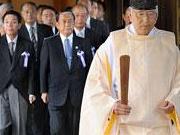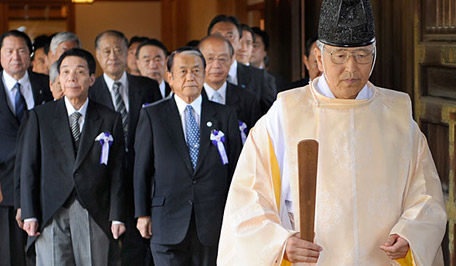| Videos | ? Latest |
|
? Feature | ? Sports | ? Your Videos |
Tensions high as Japan ministers visit war Shrine

 0 Comment(s)
0 Comment(s) Print
Print E-mail CNTV, August 16, 2012
E-mail CNTV, August 16, 2012
The visits by two Japanese cabinet ministers to the Yasukuni shrine on Wednesday are straining Japan's relations with its Asian neighbors. The visits coincided with the 67th anniversary of Japan's unconditional surrender in World War Two.
The action immediately aroused words of strong protest from China and South Korea. The visits, coupled with the country's territorial disputes, pose a serious challenge to the Japanese government's handling of its foreign policies.
A controversial visit at a sensitive time. The two cabinet ministers, National Public Safety Commission Chairman Jin Matsubara and Transport Minister Yuichiro Hata, said their visits to the shrine that honors 14 Class-A war criminals, were in a private capacity. Dozens of national lawmakers did the same on Wednesday.
The visits came on a day when the majority of the Japanese government gathered to reflect on the country's aggression during World War Two.
 |
|
Two Japanese cabinet ministers?visited the Yasukuni shrine?on?Wednesday. |
Yoshihiko Noda, Japanese prime minister, said, "We caused tremendous damage and pain to many countries, particularly the Asian people, during the war. We deeply regret that and sincerely mourn for those who were sacrificed and their relatives."
Emperor Akihito said, "I sincerely wish that the horrors of war are not repeated again. I pray for all the people of this nation and the victims of the war. I also pray for world peace."
But for Japan's close neighbors where the pain from the aggression still runs deep, the sincerity of the reflection was diluted in contrast to the shrine visit.
Japanese Prime Miniser Yoshihiko Noda has long made it clear that he himself would not be visiting the shrine and his Cabinet members would also not visit, in an official capacity. But official or not, the two ministers' visits on Wednesday have become a reality drawing extensive media and public attention
Analysts say, the visits, the first of their kind since the DPJ took power in 2009, put the Japanese government in a difficult position in its efforts to handle bilateral relations already soured by recent territorial disputes with China and South Korea.





